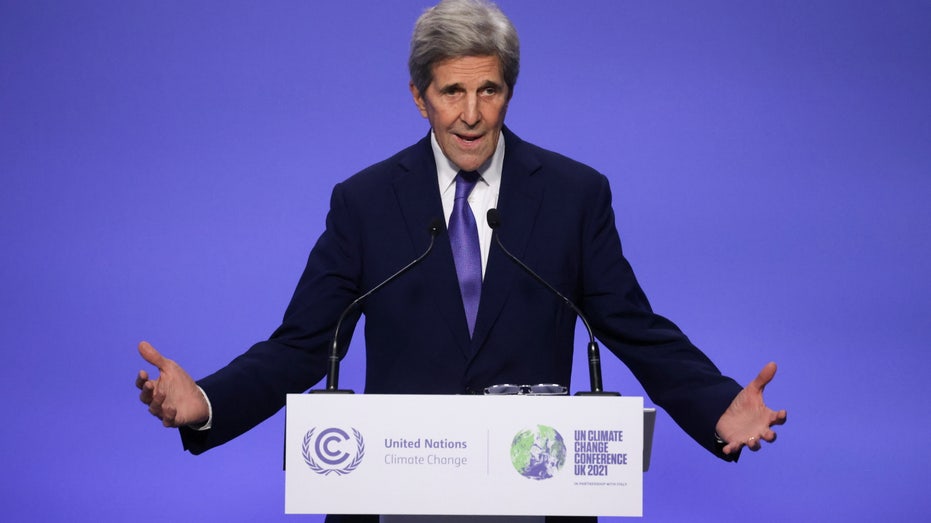Energy conference leader pans Kerry's 2050 climate goals: 'Going to still be an energy mix'
Daniel Yergin said of the world's energy mix, 'It's not going to change overnight'
USEA Director Yergin: Putin's Ukraine invasion has 'disrupted' global energy supply chain
USEA Director Daniel Yergin tells FOX Business the U.S. is in a "formidable" position as an energy producer. Yergin spoke at the CERAWeek conference in Houston.
HOUSTON – In the first event of the CERAWeek by S&P Global energy conference in Houston Monday, Special Presidential Envoy for Climate John Kerry laid out ambitious climate goals.
"We have to do enough in 2020 to 2030 to be able to achieve net-zero by 2050," Kerry said, referring to a goal for the world to reach zero carbon emissions by 2050. "In order to get that zero by 2050, that's a 45% reduction in emissions in eight years."
Immediately following the last event of CERAWeek Friday, conference host and prolific climate writer Daniel Yergin appeared to pour cold water on the former secretary of state's plans.

U.S. climate envoy John Kerry gestures as he speaks during the UN Climate Change Conference (COP26) in Glasgow, Scotland, Nov. 13, 2021. (REUTERS/Yves Herman / Reuters Photos)
"I think the word is transition, and transitions unfold over a long period of time," Yergin said in an interview with FOX Business when asked about the future of fossil fuels. "And the notion that you can get everything done in 28 years, and half of it done in eight years, you're forgetting that this is a $90 trillion world economy that gets 80% of its energy from hydrocarbons. It's not going to change overnight."
In fact, Yergin said, he investigated energy transitions in his book, "The New Map," and discovered "they unfold over a century."
The energy transition was a constant topic at CERAWeek, with executives and officials from dozens of companies and countries weighing in on how to reduce carbon emissions while preserving energy security.
John Kerry handed Putin 'keys' to energy policy: Carson
Former Secretary of Housing and Urban Development Dr. Ben Carson on Special Presidential Envoy for Climate John Kerry using the Ukrainian refugee crisis to shift the focus on climate change.
MANCHIN TO CHIEF ENERGY REGULATOR HOLDING UP NATURAL GAS PROJECTS: ‘DO YOUR DAMN JOB’
The conference came at a critical time, beginning just shy of two weeks after Russia invaded Ukraine – a move that threw the global energy markets into turmoil.
"The oil and gas industries always go through cycles. But we've just gone through, and are going through, the most violent cycle we've ever seen where prices actually went below zero [in 2020]… and now are shooting up," Yergin said.
"What's driving prices up at the gasoline pump and in other energy costs is what Vladimir Putin has done in Ukraine," he added. "He's really disrupted the global energy supply chain, which the world has counted upon and was considered reliable. And that disruption now is showing up when people fill up their cars."
Energy industry experts on Granholm, Biden shift to boost production
Energy industry experts and insiders told FOX Business that they welcome Energy Secretary Jennifer Granholm's call to increase domestic energy production.
EPA CHIEF DENIES BIDEN ADMIN DISCOURAGING INVESTMENT IN U.S. ENERGY PRODUCTION
Yergin and many others emphasized that the U.S. has the ability to help shore up that supply chain with its own energy. Yergin in "The New Map" highlights how the shale revolution radically changed the United States' direction from a path to being a major energy importer to a massive exporter.
Energy industry representatives and politicians like Sen. Joe Manchin, D-W.Va., pushed for more industry-friendly policies at the conference. Toby Rice, the CEO of EQT, which is the United States' largest producer of natural gas, touted an initiative to supercharge American liquefied natural gas exports to replace dirtier international coal.
Rice called American liquefied natural gas "the biggest green initiative on the planet." He said all the industry needs is a lighter regulatory touch from the government because permitting projects often takes longer than actually building them.
Murkowski says Biden needs to take firm action to increase energy production: 'Let's not just talk'
Sen. Lisa Murkowski, R-Alaska, talked about the Biden administration's approach to the oil and gas industry Friday, March 11, 2022, at Houston's CERAWeek conference.
GET FOX BUSINESS ON THE GO BY CLICKING HERE
But some officials, like Federal Energy Regulatory Commission Chairman Richard Glick, were resistant to suggestions from Manchin and others to reduce regulatory burdens. Glick said speeding through things like pipeline permits can actually delay projects, because it opens them up to expensive and time-consuming lawsuits.
Sen. Lisa Murkowski, R-Alaska, meanwhile demanded action from the Biden administration to accelerate permitting processes and cut red tape. If it does not, she said, investors and producers won't feel comfortable plowing money into the kinds of projects that could increase energy security worldwide.
"The president needs to get up there, and not only say it, but then direct his secretary of the interior: Where's that five-year plan? Direct [Energy] Secretary [Jennifer] Granholm: Get these LNG export permits out the door," Murkowski said. "Let's move on this. So let's just not talk at an energy conference."
























